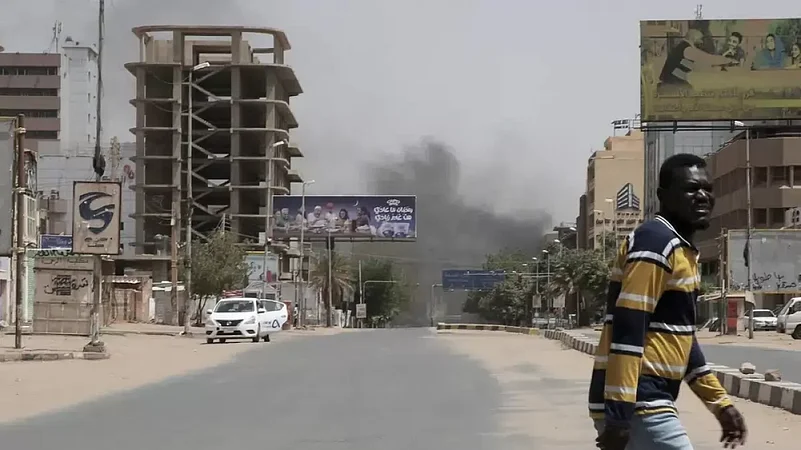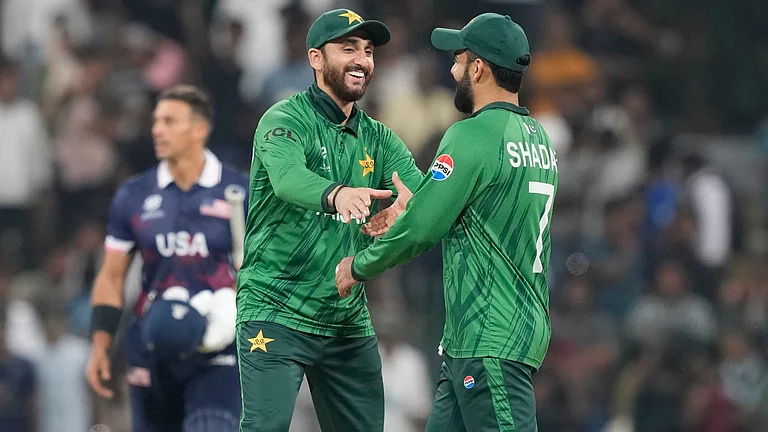Sudan's military and a powerful paramilitary force engaged in fierce fighting Saturday in the capital and elsewhere in the country, dealing a new blow to hopes for a transition to democracy and raising fears of a wider conflict.
Causalities so far:
Doctors’ groups reported at least 27 dead and 180 wounded, with the toll expected to rise.
Indian national was killed in Sudan after a stray bullet hit him in the clash between the army and RSF.
What is the clash all about?
The clashes capped months of heightened tensions between the armed forces and the Rapid Support Forces group. Those tensions had delayed a deal with political parties to get the country back to its short-lived transition to democracy, which was derailed by an October 2021 military coup.
After a day of heavy fighting, the military ruled out negotiations with the RSF, instead calling for the dismantling of what it called a “rebellious militia.” The tough language signaled that the conflict between the former allies, who jointly orchestrated the 2021 coup, was likely to continue.
Saturday’s clash:
In a statement late Saturday, the military urged Sudanese to remain inside their home as its Air Force were chasing RSF troops.
The fighting erupted early Saturday. The sound of heavy firing could be heard throughout the day across the capital, Khartoum, and its sister city of Omdurman, where the military and the RSF have amassed tens of thousands of troops since the coup.
Witnesses said fighters from both sides fired from armored vehicles and from machine guns mounted on pick-up trucks in densely populated areas. Some tanks were seen in Khartoum. The military said it launched strikes from planes and drones at RSF positions in and around the capital.
As night fell, residents said they still heard the sounds of gunfire and explosions in different parts of Khartoum, including around the military's headquarters and other other bases.
Eyewitness accounts about ground situation:
Those in Khartoum described chaotic scenes.
"Fire and explosions are everywhere,” said Amal Mohamed, a doctor in a public hospital in Omdurman. “All are running and seeking shelter.”
“We haven't seen such battles in Khartoum before,” said resident Abdel-Hamid Mustafa.
Khartoum International Airport, a flashpoint:
One of the flashpoints was Khartoum International Airport. There was no formal announcement that the airport was closed, but major airlines suspended their flights.
This included Sudan-bound flights from Egypt and Saudi Arabia which turned back after nearly landing at the airport, flight tracking data showed.
Saudi Arabia's national airline said one of its aircraft was involved in what it called “an accident.” Video showed the plane on fire on the tarmac. Another plane also appeared to have caught fire. Flight-tracking website FlightRadar24 identified it as a SkyUp Airlines Boeing 737. SkyUp is a Kyiv, Ukraine-based airline. It did not immediately respond to a request for comment.
The Sudan Doctors' Syndicate said two civilians were killed at the airport, without specifying the circumstances. Another man was shot to death in the state of North Kordofan, it said. The BBC said one of its reporters was stopped by soldiers, taken to the military headquarters and beaten.
Blame game between armed forces and RSF:
The leaders of the armed forces and the RSF traded blame over who started Saturday's fighting and offered conflicting accounts of who was in control of key installations.
Gen. Abdel-Fattah Burhan, commander of Sudan's military, told the Qatar-based satellite news network Al Jazeera that RSF troops first “harassed” the military south of Khartoum, triggering the clashes.
Burhan accused the RSF of entering Khartoum airport and setting fire to some planes. He also said all strategic facilities including the military's headquarters and the Republican palace, the seat of Sudan's presidency, are under his forces' control. He threatened to deploy more troops to Khartoum from across the county.
The head of the RSF, Gen. Mohammed Hamdan Dagalo, accused Burhan of starting the battle by surrounding RSF troops. "This criminal, he forced this battle upon us,” he said.
Dagalo told Al Jazeera that he believes that in “the next few days” it would be over.
The RSF alleged that its forces controlled strategic locations in Khartoum and the northern city of Merowe some 350 kilometers (215 miles) northwest of the capital. The military dismissed the claims as “lies.”
The fighting comes after months of escalating tensions between the generals and years of political unrest after the 2021 coup. The tensions stem from a disagreement over how the RSF, headed by Dagalo, should be integrated into the armed forces and what authority should oversee the process. The merger is a key condition of Sudan's unsigned transition agreement with political groups.
Pro-democracy activists have blamed Burhan and Dagalo for abuses against protesters across the county over the past four years, including the deadly break-up of a protest camp outside the military's headquarters in Khartoum in June 2019 that killed over 120 protesters. Many groups have repeatedly called for holding them accountable. The RSF has long been accused of atrocities linked to the Darfur conflict.
Calls for ceasefire:
U.S. Secretary of State Antony Blinken and other top diplomats expressed extreme concern Saturday over the outbreak of violence. “We urge all actors to stop the violence immediately and avoid further escalations or troop mobilizations and continue talks to resolve outstanding issues,” Blinken wrote on Twitter.
U.N. Secretary-General Antonio Guterres; the European Union's top diplomat, Josep Borrell; the head of the African Union Commission, Moussa Faki Mahamat; the Arab League chief, Ahmed Aboul Gheit; and Qatar all called for a cease-fire and for both parties to return to negotiations. Egypt, Saudi Arabia and the United Arab Emirates called on those fighting in Sudan to exercise restraint and work toward a political solution in the county.
(With AP inputs)


























